Distance MBA Course
A Distance MBA (Master of Business Administration) course is a program designed for individuals who cannot attend regular MBA, on-campus classes due to various reasons such as work commitments, geographical constraints, or personal obligations.

Image – 1 SAITM College
In a Distance MBA course, the curriculum, study materials, and instructional support are delivered remotely, allowing students to study from their own locations.
Distance MBA programs typically provide identical curriculum and coursework as traditional, on-campus MBA programs, encompassing fundamental subjects in business administration like finance, marketing, human resources, strategy, and organizational behavior. However, the mode of delivery differs, with distance learning relying heavily on online platforms, printed study materials, video lectures, and occasional in-person sessions or exams.
Key components of a Distance MBA course may include:
Online Learning Platforms
These platforms serve as the primary medium for delivering lectures, assignments, quizzes, and discussion forums. Students access course materials, interact with faculty and peers, and submit assignments through these platforms.
Study Materials
Course materials, including textbooks, study guides, lecture notes, and case studies, are provided either in printed format or electronically through online platforms. These resources facilitate self-study and comprehension of key concepts.
Virtual Classroom Sessions

Image – 2 Analysing Market Growth
Some Distance MBA programs incorporate live or recorded virtual classroom sessions where students can attend lectures, participate in discussions, and interact with faculty and classmates in real-time or asynchronously.
Assignments and Assessments

Image – 3 Doing Projects to Increase Knowledge
Students are required to complete assignments, projects, quizzes, and exams to demonstrate their understanding of the course material and to receive grades.
Academic Support
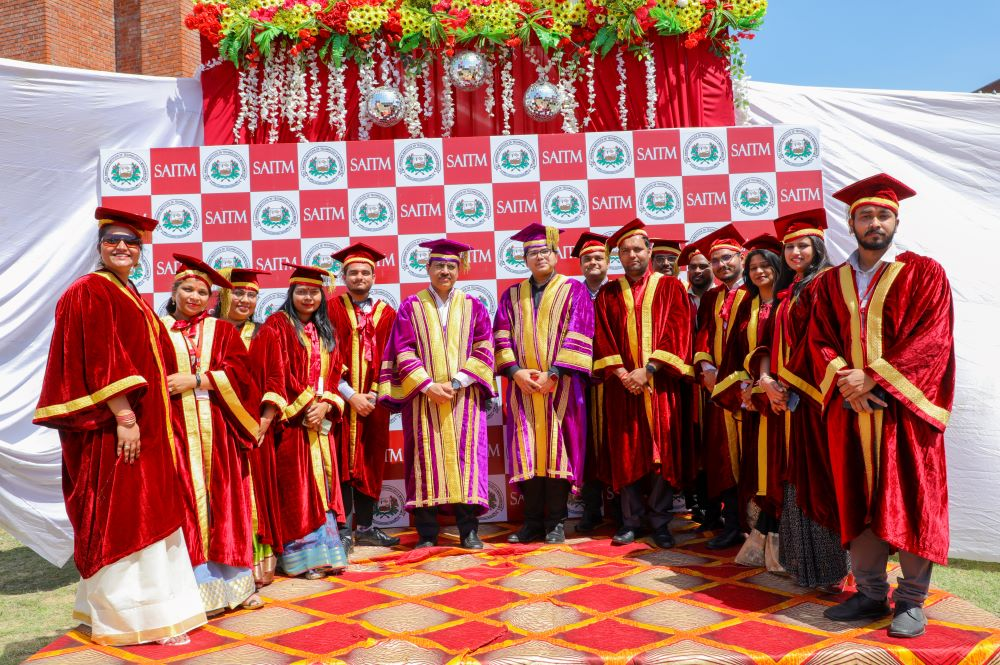
Image – 4 SAITM Faculty
Distance MBA programs often provide academic support services such as online tutoring, mentoring, and access to faculty members for clarifying doubts and seeking guidance.
Flexible Schedule
One of the primary advantages of Distance MBA courses is the flexibility they offer in terms of study schedule. Students can balance their academic pursuits with professional and personal commitments by accessing course materials and completing assignments at their convenience.
Some of the most opted courses in India and St. Andrews college or different Engineering college or Management colleges are as follows:-
- Btech
- Btech CSE
- Btech ETCE
- MTech
- BCA
- BBA
- MBA
- MCA
- DPharma – St. Andrews College of Pharmacy
- BPharma – St. Andrews College of Pharmacy
- BArch – St. Andrews College of Architecture
Online MBA Course

Image – 5 SAITM New Management Block
An Online MBA (Master of Business Administration) course mirrors the structure of a traditional MBA program but is exclusively delivered through Online mode platforms. These programs aim to provide flexibility and accessibility to working professionals, individuals with familial responsibilities, or those unable to participate in on-campus classes.
Here are some key features and components of an Online MBA course:
Virtual Learning Environment
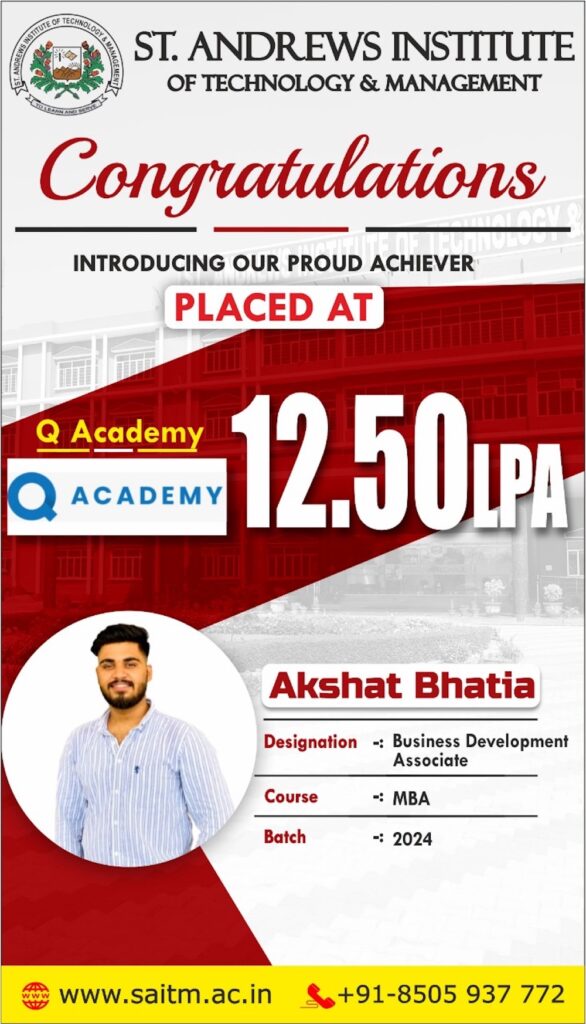
Image – 6 Student Placed from SAITM
Online MBA degree program utilize a virtual learning environment, which includes online platforms, learning management systems (LMS), and multimedia tools to deliver lectures, course materials, assignments, and interactive discussions.
Curriculum
The curriculum of an Online MBA degree typically covers core business disciplines such as finance, marketing, human resources, strategy, and leadership. Some programs offer specializations or concentrations in areas like entrepreneurship, healthcare management, finance, or information technology.
Interactive Content
Online MBA degree often incorporate various interactive content formats such as video lectures, multimedia presentations, simulations, case studies, and online discussions to engage students and enhance learning outcomes.
Flexible Schedule
One of the primary advantages of an Online MBA degree is its flexibility. Students can access course materials, participate in discussions, and complete assignments at their own speed and according to their schedule, allowing them to balance their academic pursuits with professional and personal commitments.
Networking Opportunities
Despite being online, many Online MBA programs facilitate networking opportunities through virtual events, discussion forums, alumni networks, and collaborative group projects, enabling students to connect with peers, faculty, and industry professionals from diverse backgrounds.
Support Services
Online MBA programs typically provide various support services to assist students throughout their academic journey. These may include online tutoring, academic advising, career counseling, technical support, and access to online libraries and research databases.
Assessment and Evaluation

Image – 7 Award of Best Management College
Assessment methods in Online MBA programs may include assignments, quizzes, exams, projects, presentations, and group work. These assessments are often conducted online and may be proctored to ensure academic integrity.
Accreditation and Recognition

Image – 8 Award received by SAITM College
It’s important to choose an Online MBA course offered by a reputable institution that is accredited by recognized accrediting bodies or agencies. Accreditation ensures that the program meets established quality standards and enhances the credibility and recognition of the degree.
Difference Between Online MBA & Distance MBA
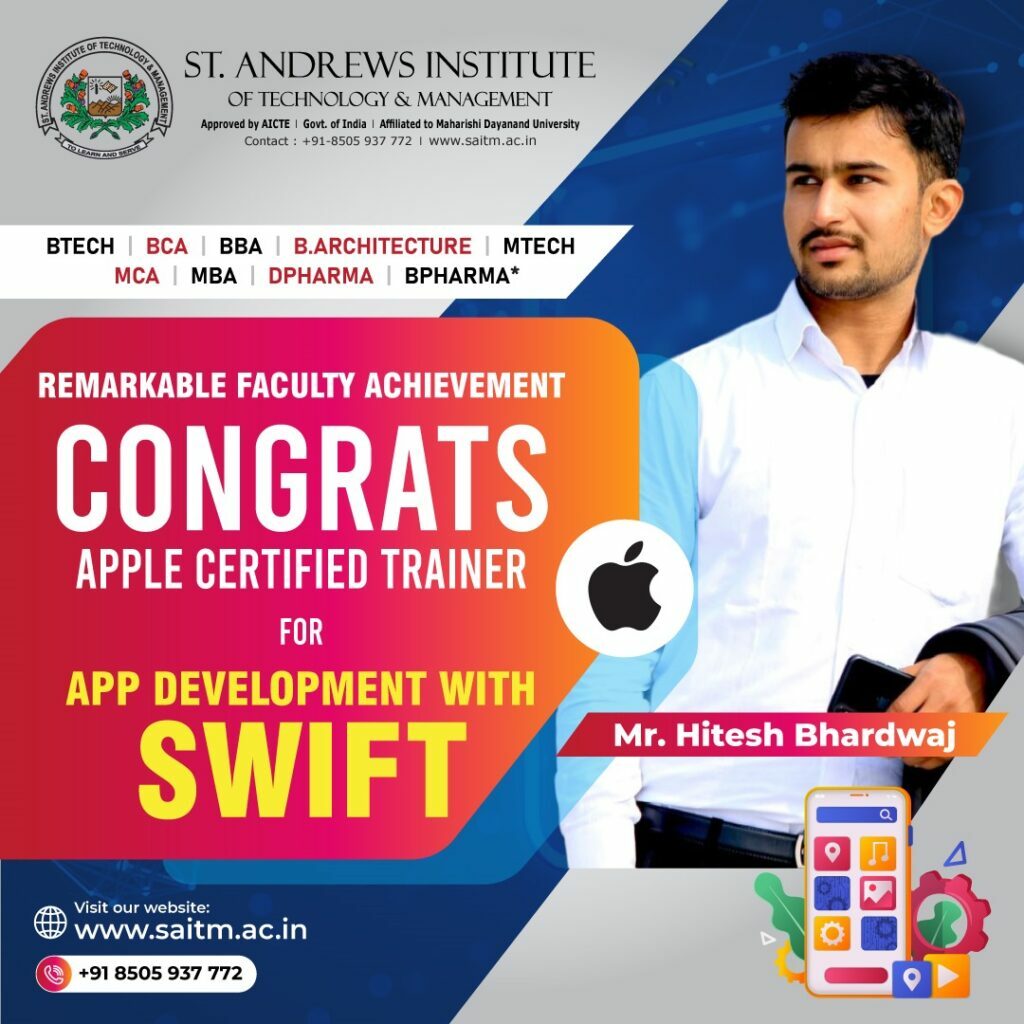
Image – 9 Faculty Achievement
The terms “Online MBA” and “Distance MBA” are often used interchangeably, but there are some subtle differences between the two concepts:
Mode of Delivery:
Online MBA
In an Online MBA course, the primary mode of delivery is through the Online mode, utilizing internet-based technologies. This encompasses virtual classrooms, video lectures, online discussions, and interactive multimedia content. Students commonly engage with course materials and fulfill assignments exclusively through the Online mode.
Distance MBA
A Distance MBA program may utilize a variety of delivery methods, including printed study materials, correspondence, and occasional in-person sessions or exams. While online components may be included, distance learning encompasses a broader range of delivery methods beyond the internet.
Flexibility:
Online MBA
Online MBA programs are known for their high degree of flexibility, allowing students to access course materials, participate in discussions, and complete assignments at their convenience and pace.
Distance MBA
Distance MBA programs also offer flexibility but may have slightly less flexibility compared to online programs, especially if they involve physical study materials or occasional in-person requirements.
Technological Dependence:
Online MBA
Online MBA programs rely heavily on internet-based technologies and require students to have access to a reliable internet connection and appropriate hardware devices such as computers or tablets.
Distance MBA
While distance MBA programs may incorporate online components, they may also rely on traditional methods such as printed study materials, CDs, DVDs, or postal correspondence. This makes them potentially more accessible to individuals with limited internet connectivity or technological resources.
Interaction and Engagement:
Online MBA
Online MBA programs often emphasize interactive learning experiences, facilitated through virtual classrooms, discussion forums, group projects, and collaborative tools.
Distance MBA
Distance MBA programs may offer interaction opportunities through various channels, but the level of interactivity may vary depending on the delivery methods used. They may rely more on self-directed study and asynchronous communication.
Recognition and Accreditation:
Online MBA
Online MBA programs are increasingly gaining recognition and accreditation from reputable accrediting bodies and institutions. Many top universities and business schools offer fully online MBA programs with the same accreditation as their on-campus counterparts.
Distance MBA
Distance MBA programs may vary in terms of accreditation and recognition, depending on the institution offering the program. It’s important for students to ensure that the program they choose is accredited by recognized accrediting bodies to ensure the quality and credibility of the degree.
Advantages of Distance MBA Courses

Image – 10 Boys Hostel of SAITM
Distance MBA courses offer several advantages for individuals seeking to pursue higher education in business administration while accommodating work, family, or other commitments.
Some of the key advantages include:
Flexibility
One of the most significant advantages of Distance MBA courses is the flexibility they offer. Students can study from anywhere and at any time, allowing them to balance their academic pursuits with professional, personal, or other responsibilities.
Accessibility
Distance MBA programs make higher education in business administration accessible to individuals who may not have the opportunity to attend traditional on-campus classes due to geographical constraints, work schedules, or other limitations.
Cost-Effectiveness
Distance MBA programs often have lower fee structure compared to traditional on-campus programs. Additionally, students can save on costs associated with commuting, accommodation, and relocation, making it a more affordable option for many individuals.
Work-Study Balance
Distance MBA courses allow working professionals to continue their careers while pursuing higher education. They can apply theoretical knowledge gained from the program directly to their workplace, enhancing their skills and advancing their careers simultaneously.
Self-Paced Learning
Distance MBA programs typically offer self comfort learning, allowing students to progress through the coursework at their own speed. This flexibility enables students to delve deeper into topics of interest, review materials as needed, and manage their learning according to their individual preferences and abilities.
Diverse Learning Resources
Distance MBA programs utilize a variety of learning resources, including online lectures, e-books, video tutorials, case studies, and interactive multimedia materials. This diverse range of resources caters to different learning styles and enhances the overall learning experience.
Global Networking Opportunities
Many Distance MBA programs attract a diverse cohort of students from around the world. This provides opportunities for students to network, collaborate, and learn from peers with diverse backgrounds and perspectives, enriching their academic experience and expanding their professional network.
Career Advancement
Earning an MBA degree, even through a distance learning program, can significantly enhance career prospects and open up opportunities for advancement in various industries and sectors. Employers often value the skills, knowledge, and credentials gained from an MBA program, regardless of the mode of delivery.
Continued Professional Development
Distance MBA programs are not only suitable for individuals seeking career advancement but also for those interested in continuous professional development. These programs enable professionals to stay updated with the latest trends, developments, and best practices in the field of business administration.
Advantages of Online MBA Courses

Image – 11 National Conference hosted by SAITM
Online MBA courses provide several benefits for individuals looking to pursue higher education in business administration online. Some of the key advantages include:
Flexibility–
Online MBA programs provide unparalleled flexibility, allowing students to study from anywhere with an internet connection. This flexibility is especially beneficial for working professionals, parents, or individuals with other commitments, as they can schedule their studies around their work and personal life.
Accessibility:
Online MBA courses break down geographical barriers, enabling students to access high-quality online education from top institutions around the world without the need for relocation. This accessibility opens up opportunities for individuals who may not have access to traditional on-campus programs due to location or other constraints.
Cost-Effectiveness:
Online MBA programs often have lower fee structure compared to traditional on-campus programs. Additionally, students can save on costs associated with commuting, accommodation, and relocation, making it a more affordable option for many individuals.
Customized Learning Experience
Online MBA courses offer a personalized learning experience, allowing students to progress through the coursework at their own pace. They can review materials as needed, focus on areas of interest, and tailor their study schedule to fit their individual preferences and commitments.
Diverse Learning Resources:
Online MBA programs utilize a wide range of learning resources, including video lectures, interactive multimedia materials, e-books, case studies, and online forums. This diverse array of resources caters to different learning styles and enhances the overall learning experience.
Global Networking Opportunities:
Online MBA programs attract a diverse cohort of students from around the world, providing opportunities for networking, collaboration, and cultural exchange. Students can connect with peers, faculty, and industry professionals from diverse backgrounds, expanding their professional network and gaining insights into global business practices.
Career Advancement:
Earning an MBA degree online can significantly enhance career prospects and open up opportunities for advancement in various industries and sectors. Employers often value the skills, knowledge, and credentials gained from an MBA program, regardless of the mode of delivery.
Technological Skills Development
Online MBA courses require students to engage with various digital tools and technologies, helping them develop valuable technological skills that are increasingly in demand in today’s digital economy. These skills include proficiency in online collaboration, data analysis, and digital communication.
Continued Professional Development:
Online MBA programs are not only suitable for individuals seeking career advancement but also for those interested in continuous professional development. These programs enable professionals to stay updated with the latest trends, developments, and best practices in the field of business administration.
Eligibility Criteria for Distance MBA Courses
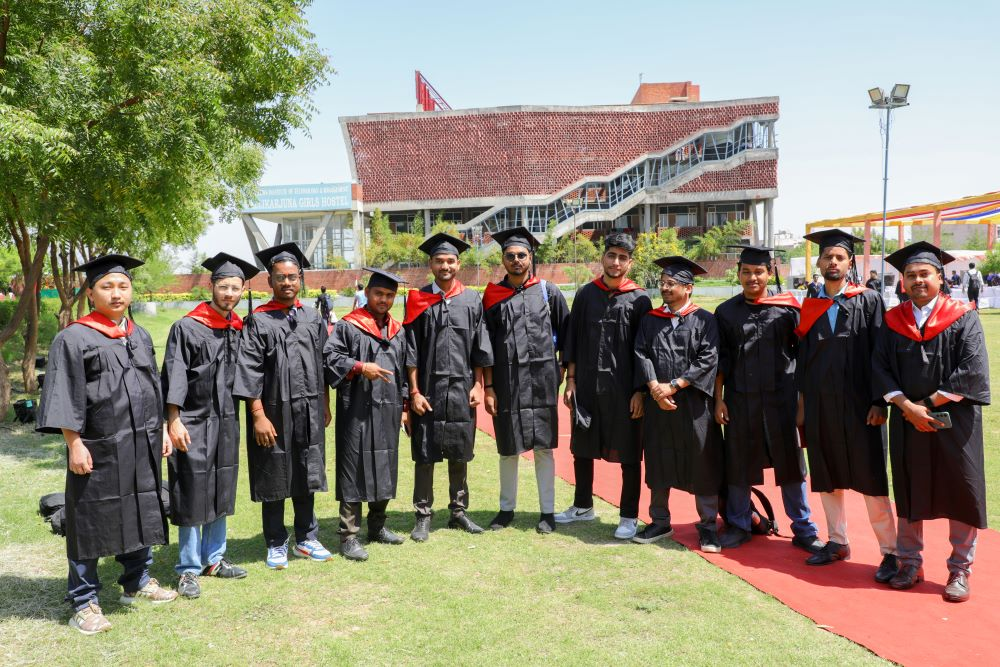
Image – 12 Convocation at SAITM Campus
The eligibility criteria for Distance MBA courses may vary depending on the institution offering the program. However, some common eligibility requirements typically include:
Educational Qualifications
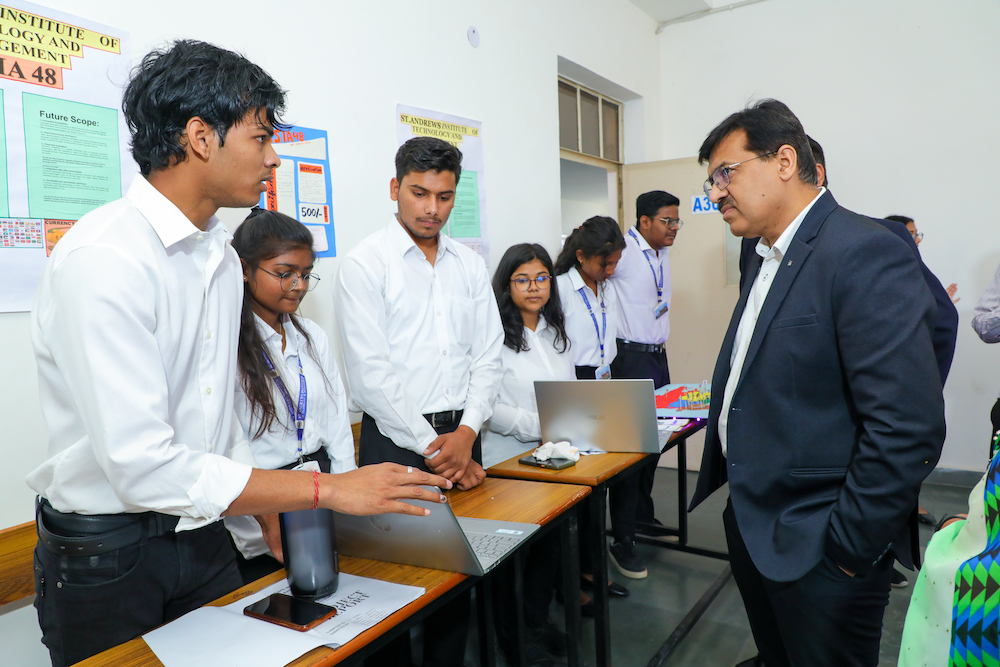
Image – 13 Project Exhibition 2023
Applicants must have a bachelor’s degree in any discipline from a recognized university or institution. The degree should be awarded by an accredited institution and meet the minimum academic standards set by the university offering the Distance MBA program.
Minimum Aggregate Percentage
Some institutions may require candidates to have a minimum aggregate percentage in their bachelor’s degree. This percentage requirement varies among institutions but is typically in the range of 50% to 60%. However, some universities may waive this requirement for candidates with relevant work experience.
Work Experience (Optional)
While not always mandatory, some Distance MBA programs may prefer candidates with prior work experience. The duration and type of work experience required may vary depending on the institution and the specific MBA program. Work experience is often valued as it contributes to the diversity of perspectives in the classroom and enhances the learning experience.
Entrance Exams (Optional)
Some universities may require candidates to take entrance exams such as CAT (Common Admission Test), MAT (Management Aptitude Test), XAT (Xavier Aptitude Test), or the university’s own entrance exam. However, many Distance MBA programs do not have entrance exams, particularly for candidates with relevant work experience.
English Language Proficiency
Since the medium of instruction for Distance MBA programs is often English, applicants whose native language is not English may be required to demonstrate proficiency in English through standardized tests such as TOEFL (Test of English as a Foreign Language) or IELTS (International English Language Testing System).
Other Requirements
Depending on the institution, applicants may be required to submit additional documents such as letters of recommendation, a statement of purpose (SOP), and a resume or curriculum vitae (CV). These documents help the admissions committee assess the candidate’s suitability for the program.
Eligibility Criteria for Online MBA Courses
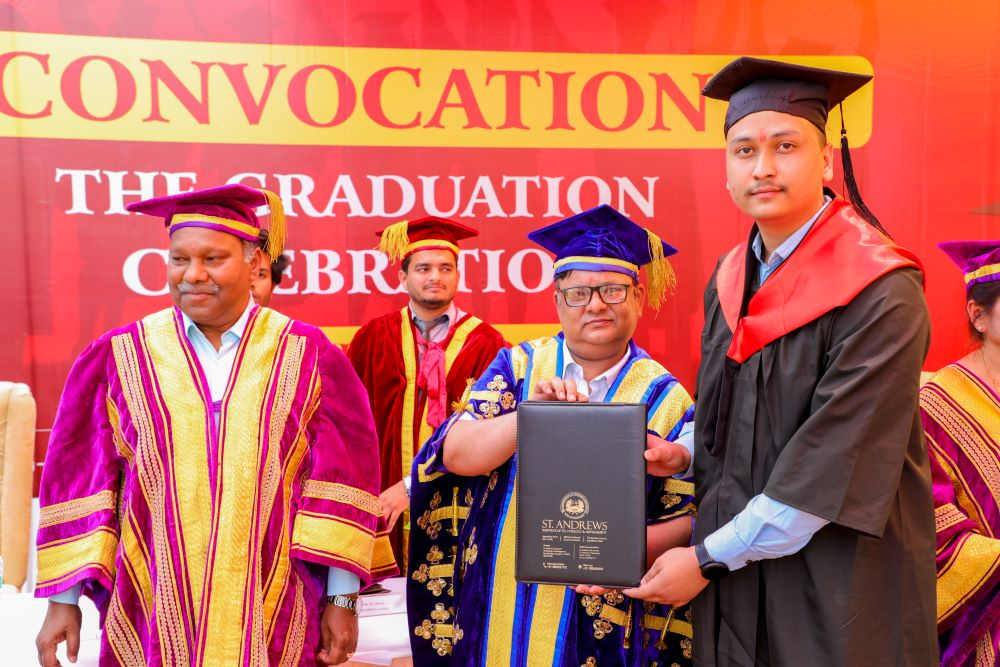
Image – 14 Convocation Ceremony
Eligibility criteria for online MBA courses can vary depending on the institution offering the program, but there are some common requirements you might encounter:
Educational Background
Typically, applicants are required to have a bachelor’s degree from an accredited institution. The field of study for the bachelor’s degree may not always be specified, but some programs may prefer applicants with a background in business or a related field.
Work Experience
While not always mandatory, many MBA programs, both online and traditional, prefer applicants with some work experience, especially for executive MBA programs. This requirement can vary widely, ranging from a couple of years to a decade or more.
Standardized Test Scores
Some online MBA programs require applicants to submit scores from standardized tests. However, not all programs require these test scores, and some may waive the requirement based on certain criteria, such as extensive work experience or academic performance.
Letters of Recommendation
Many programs ask for letters of recommendation from professional or academic contacts who can speak to the applicant’s qualifications, character, and potential for success in the MBA program.
Statement of Purpose or Essays
Applicants are often required to submit a statement of purpose or essays explaining their reasons for pursuing an MBA, their career goals, and how the program aligns with their aspirations.
Resume/CV
A current resume or curriculum vitae (CV) detailing the applicant’s educational background, work experience, skills, and accomplishments is typically required.
Interviews
Some programs may require an interview as part of the application process to assess the candidate’s fit for the program and to learn more about their goals and experiences.
Admission Process of Distance MBA

Image -15 SAITM Technical Block
The admission process for distance MBA programs can vary slightly depending on the institution offering the program, but here’s a general overview of what you might encounter:
Research and Choose Programs
Start by researching different distance MBA programs to find the ones that best suit your needs and career goals. Consider factors such as accreditation, curriculum, faculty, reputation, and cost.
Check Eligibility Criteria
Review the eligibility criteria for each program you’re interested in to ensure you meet the requirements regarding educational background, work experience (if any), standardized test scores (if required), and other prerequisites.
Application Submission
Complete the application form for the distance MBA program(s) you wish to apply to. This often involves providing personal information, educational history, work experience, and contact details. Some programs may require additional documents such as transcripts, letters of recommendation, a resume/CV, and essays or a statement of purpose.
Application Fee
Pay any required application fees when submitting your application. Fees can vary depending on the program and institution.
Review and Evaluation
Once your application is submitted, it will be reviewed by the admissions committee. They will assess your qualifications, work experience, academic background, test scores (if applicable), and any other relevant factors.
Admissions Decision
After reviewing your application, the admissions committee will make a decision regarding your admission to the program. You will typically be notified of the decision via email or postal mail.
Acceptance and Enrollment
If you’re offered admission to the program, you will need to accept the offer by the specified deadline to secure your spot. You may also need to pay an enrollment deposit or complete other enrollment-related tasks.
Orientation and Course Registration

Image – 16 Orientation
Once you’ve accepted your offer of admission and enrolled in the program, you may be required to participate in an orientation session to familiarize yourself with the program structure, policies, and resources. You’ll also typically register for your courses for the upcoming term or semester.
Begin Classes

Image -17 Distance MBA Students Coming to Submit Assignments
With your enrollment confirmed and courses registered, you can start your distance MBA classes according to the program schedule. This may involve accessing online learning platforms, attending virtual lectures, completing assignments, and participating in discussions with instructors and fellow students.
Admission Process of Online MBA Program
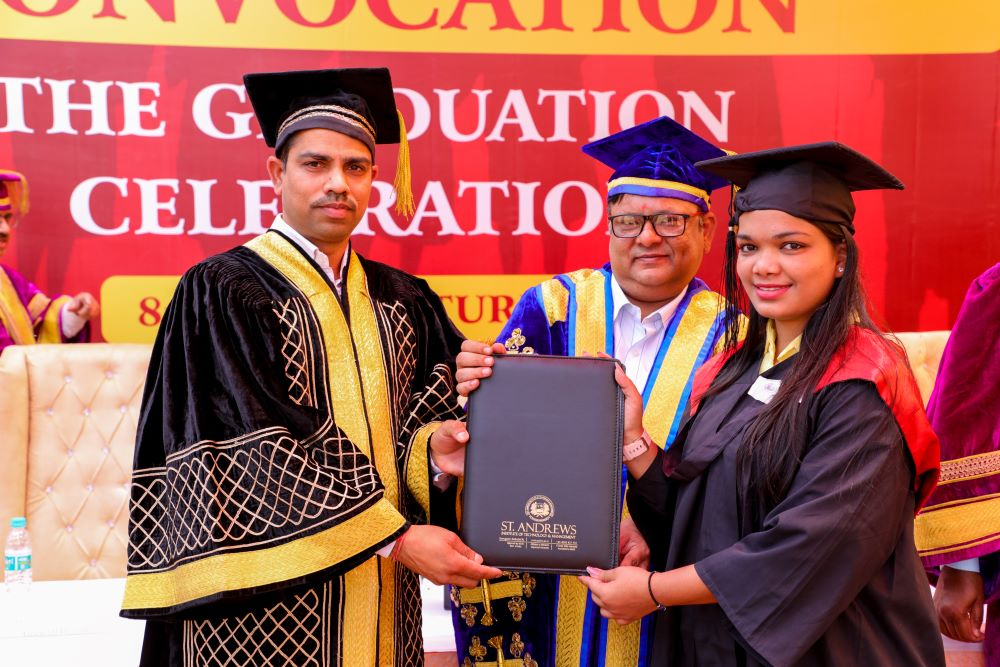
Image -18 Degree Distribution
The admission process for online MBA programs is similar to traditional MBA programs, but with some variations to accommodate the online format. Here’s a step-by-step overview of what you might expect:
Research and Choose Programs
Start by researching different online MBA programs to find ones that align with your career goals, schedule, and preferences. Consider factors such as accreditation, specialization options, faculty expertise, program format, and tuition costs.
Check Eligibility Criteria
Review the eligibility requirements for each program you’re interested in. These criteria typically include educational background, work experience, standardized test scores (if required), and other prerequisites. Ensure that you meet all the requirements before applying.
Application Submission
Complete the online application form for the online MBA program(s) you wish to apply to. This usually involves providing personal information, academic history, professional experience, contact details, and any required documents such as transcripts, letters of recommendation, a resume/CV, and essays or a statement of purpose.
Application Fee
Pay any required application fees when submitting your application. Application fees can vary depending on the program and institution.
Standardized Test Scores (if required)
Some online MBA programs require applicants to submit scores from standardized tests. Ensure that you schedule and take the required test(s) well in advance of the application deadline, if applicable.
Review and Evaluation
Once your application is submitted, it will be reviewed by the admissions committee. They will assess your qualifications, work experience, academic background, test scores (if applicable), and other relevant factors to determine your suitability for the program.
Admissions Decision
After reviewing your application, the admissions committee will make a decision regarding your admission to the program. You will typically be notified of the decision via email or through the online application portal.
Acceptance and Enrollment
If you’re offered admission to the program, you will need to accept the offer by the specified deadline to secure your spot. You may also need to pay an enrollment deposit or complete other enrollment-related tasks.
Orientation and Course Registration
Once you’ve accepted your offer of admission and enrolled in the program, you may be required to participate in an orientation session to familiarize yourself with the program structure, policies, and resources. You’ll also typically register for your courses for the upcoming term or semester.
Begin Classes
With your enrollment confirmed and courses registered, you can start your online MBA classes according to the program schedule. This may involve accessing online learning platforms, attending virtual lectures, completing assignments, and participating in discussions with instructors and fellow students.
Distance MBA Fees

Image – 19 Project Exhibition at SAITM
The fee structure for distance MBA programs can vary widely depending on factors such as the institution offering the program, its reputation, accreditation status, program format, duration, and additional services provided.
Here are some common components of distance MBA fees to consider:
Tuition Fees
This is the primary cost of the program, covering the instructional content and academic resources. Tuition fees can vary significantly between institutions and may be charged per course, per semester, or as a total program cost.
Registration Fees
Some distance MBA programs may require students to pay a one-time registration fee or an annual registration fee to enroll in the program.
Technology Fees
Since distance MBA programs are typically delivered online, there may be technology fees to cover the cost of accessing online learning platforms, software licenses, technical support, and other digital resources.
Course Materials
Depending on the program, students may need to purchase textbooks, e-books, course packs, or other instructional materials separately. Some programs may include course materials in the tuition fees or provide them at a discounted rate.
Examination Fees
If the program includes proctored examinations or assessments, there may be additional fees associated with scheduling, administering, and proctoring these exams.
Graduation Fees
Upon completion of the program, students may need to pay graduation fees to cover the cost of diploma processing, academic regalia, and participation in graduation ceremonies (if applicable).
Miscellaneous Fees
Other miscellaneous fees may include library access fees, administrative fees, student services fees, and any optional services or resources offered by the institution.
Online MBA Fees

Image – 20 Sports Day Event
The fee structure for online MBA programs can vary widely depending on several factors, including the institution offering the program, its reputation, accreditation status, program format, duration, and additional services provided.
Here’s a breakdown of some common components of online MBA fees:
Tuition Fees
This is typically the largest component of the fees and covers the cost of instruction, course materials, and access to online learning platforms. Tuition fees can vary significantly between institutions and may be charged per credit hour, per semester, or as a total program cost.
Technology Fees
Since online MBA programs are delivered digitally, there may be technology fees to cover the cost of accessing online learning platforms, software licenses, technical support, and other digital resources.
Registration Fees
Some online MBA programs may require students to pay a one-time registration fee or an annual registration fee to enroll in the program.
Course Materials
Depending on the program, students may need to purchase textbooks, e-books, course packs, or other instructional materials separately. Some programs may include course materials in the tuition fees or provide them at a discounted rate.
Examination Fees
If the program includes proctored examinations or assessments, there may be additional fees associated with scheduling, administering, and proctoring these exams.
Graduation Fees
Upon completion of the program, students may need to pay graduation fees to cover the cost of diploma processing, academic regalia, and participation in graduation ceremonies (if applicable).
Miscellaneous Fees
Other miscellaneous fees may include library access fees, administrative fees, student services fees, and any optional services or resources offered by the institution.
Top Online MBA Courses in India

Image – 21 Project Exhibition at SAITM
Several institutions in India offer online MBA programs with various specializations to cater to the diverse career interests and industry needs of students.
Here are some of the top online specialization MBA courses available in India:
Marketing Management:
Specialization in marketing management focuses on topics such as market research, branding, advertising, consumer behavior, and digital marketing strategies.
Finance Management:
Specialization in finance management covers areas such as financial analysis, investment management, corporate finance, risk management, and financial markets.
Human Resource Management (HRM):
Specialization in HRM focuses on topics such as recruitment and selection, performance management, training and development, compensation management, and organizational behavior.
Information Technology Management:
Specialization in IT management focuses on topics such as information systems, database management, IT project management, cybersecurity, and emerging technologies.
International Business Management:
Specialization in international business management covers areas such as global marketing, international finance, cross-cultural management, international trade, and global strategy.
Entrepreneurship Management:
Specialization in entrepreneurship management focuses on topics such as business planning, startup financing, innovation management, entrepreneurial strategy, and venture capital.
Top Distance MBA Courses in India
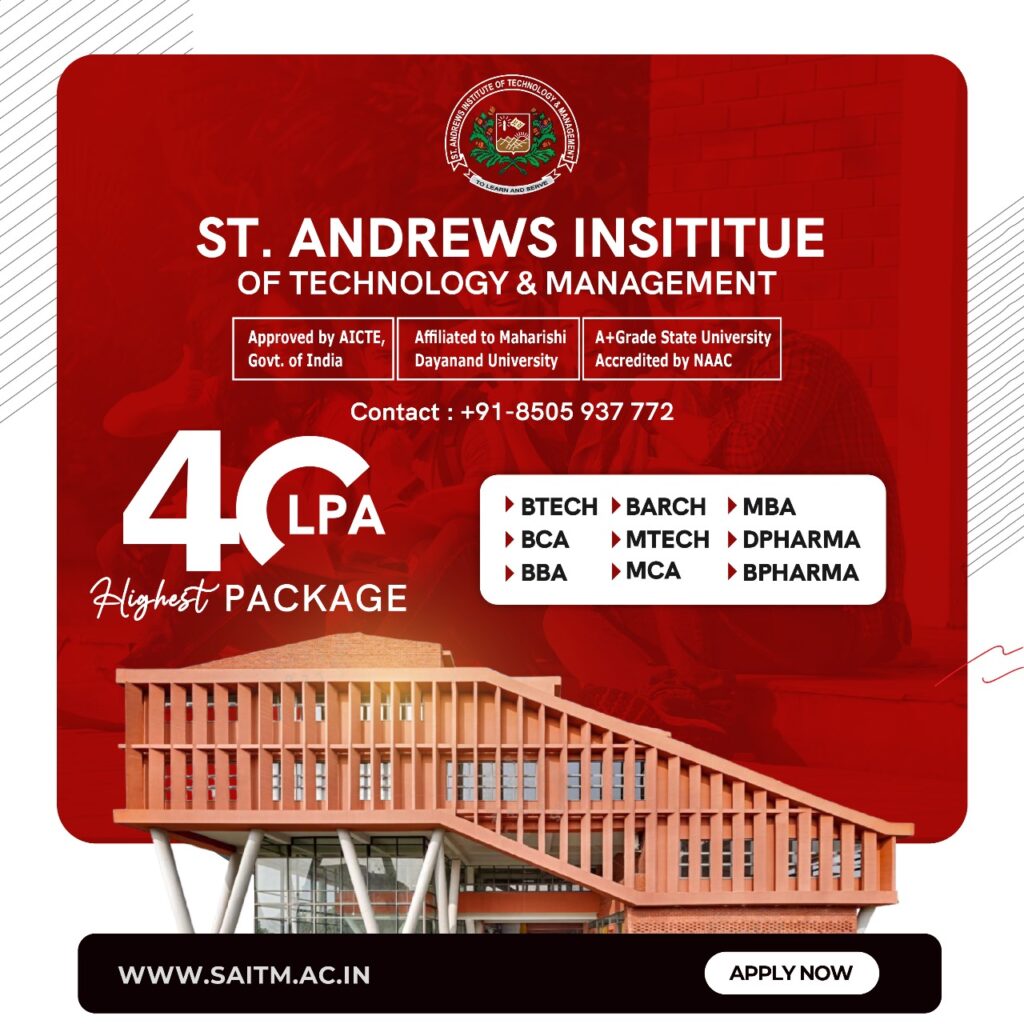
Image – 22 Courses Overview
Several institutions in India offer distance MBA programs with various specializations to cater to the diverse career interests and industry needs of students.
Here are some of the top distance MBA specialization courses available in India:
Marketing Management:
Specialization in marketing management focuses on topics such as market research, branding, advertising, consumer behavior, and digital marketing strategies.
Finance Management:
Specialization in finance management covers areas such as financial analysis, investment management, corporate finance, risk management, and financial markets.
Human Resource Management (HRM):
Specialization in HRM focuses on topics such as recruitment and selection, performance management, training and development, compensation management, and organizational behavior.
Operations Management
Specialization in operations management covers areas such as supply chain management, logistics, quality management, project management, and operations strategy.
Information Technology Management:
Specialization in IT management focuses on topics such as information systems, database management, IT project management, cybersecurity, and emerging technologies.
International Business Management:

Image – 23 MBA in International Business Management
Specialization in international business management covers areas such as global marketing, international finance, cross-cultural management, international trade, and global strategy.
Entrepreneurship Management:
Specialization in entrepreneurship management focuses on topics such as business planning, startup financing, innovation management, entrepreneurial strategy, and venture capital.
Top Online MBA Colleges

Image – 24 SAITM Campus Overview
Institutions in India offering fully online MBA programs are relatively limited compared to private institutions.
However, some institutions offering online MBA programs with online components. Here are a few examples:
Dr. B.R. Ambedkar Open University (BRAOU):
BRAOU is a state open recognized university located in Hyderabad, Telangana.
While BRAOU primarily offers online education programs, it may offer online programs and resources.
BRAOU offers Master of Business Administration (MBA) program through online education mode, which may include online components.
Yashwantrao Chavan Maharashtra Open University (YCMOU):
YCMOU is a state open recognized university located in Maharashtra.
While YCMOU primarily offers online education programs, it may offer online courses and resources.
YCMOU offers a Master of Business Administration (MBA) program through online mode, which may include online components.
Top Distance MBA Colleges

Image – 25 SAITM College Campus
In India, several institutions offer distance MBA programs that are recognized and respected.
Here are a few notable ones:
Dr. B.R. Ambedkar Open University (BRAOU):
BRAOU, formerly known as Andhra Pradesh Open University, is a state university located in Hyderabad, Telangana.
BRAOU provides a Master of Business Administration (MBA) program through the mode of remote learning.
The MBA program at BRAOU is designed to cater to the needs of working professionals and individuals seeking management education through flexible learning options.
Yashwantrao Chavan Maharashtra Open University (YCMOU):
YCMOU is a state open university located in Nashik, Maharashtra.
YCMOU offers a Master of Business Administration (MBA) program through the mode of remote learning.
The MBA program at YCMOU aims to equip students with management skills and knowledge required for various sectors and industries.
Madhya Pradesh Bhoj Open University (MPBOU):
MPBOU is a state open university located in Bhopal, Madhya Pradesh.
MPBOU offers a Master of Business Administration (MBA) program through the mode of remote learning.
The MBA program at MPBOU focuses on providing quality management education to students who are unable to pursue full-time, on-campus programs.
Online MBA Syllabus
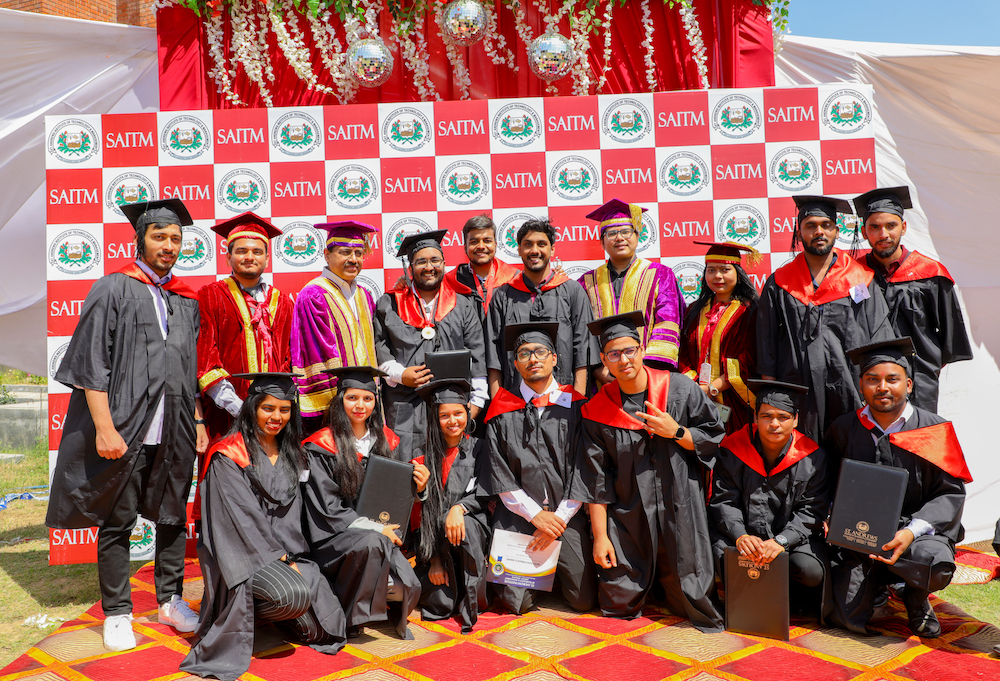
Image – 26 2022 Batch Convocation
The syllabus for an online MBA program can vary depending on the institution, but generally, it covers a broad range of business-related topics designed to equip students with the skills necessary to excel in managerial and executive positions. Here is a typical structure of an online MBA syllabus:
Core Courses
Business Management: Introduction to management theories, practices, and strategic decision-making.
Accounting and Finance: Fundamentals of financial accounting, managerial accounting, and financial management.
Marketing Management: Principles of marketing, market analysis, and strategic marketing planning.
Operations Management: Operations strategy, process analysis, and supply chain management.
Human Resources Management: HR strategies, labor relations, and organizational behavior.
Business Analytics: Data analysis, decision-making techniques, and the use of software tools for business analytics.
Economics for Managers: Microeconomics and macroeconomics principles affecting business decisions.
Corporate Ethics and Law: Legal environment of business, corporate governance, and ethical decision-making.
Elective Courses
Students choose from specialized areas such as International Business, Information Technology Management, Entrepreneurship, Healthcare Management, etc.
Capstone Project or Thesis
A comprehensive project or research thesis that requires students to apply their learning to solve real-world business problems.
Leadership and Development Workshops
Workshops and seminars focused on developing leadership skills, networking, and personal development.
Internships or Practical Experience
Practical experience through internships or projects with businesses to apply theoretical knowledge.
This curriculum structure ensures that students not only learn the theoretical aspects of business but also develop practical skills through interactive and applied learning approaches.
Distance MBA Syllabus

Image – 27 SAITM College Campus
The syllabus for a Distance MBA (Master of Business Administration) program can vary depending on the university or institution offering the course. However, most Distance MBA programs cover core business disciplines designed to build a solid foundation in business management. Here’s a typical structure of the syllabus for a Distance MBA:
Year 1
- Management Theory and Practice: Introduces basic management concepts, organizational theories, and leadership styles.
- Business Communication: Focuses on effective communication skills in business, including writing and presentation skills.
- Accounting for Managers: Covers the fundamentals of financial and managerial accounting.
- Economics for Managers: Introduces microeconomics and macroeconomics concepts applicable to managerial decision-making.
- Business Statistics: Teaches statistical analysis and tools for business decision-making.
- Marketing Management: Focuses on the strategies and operations involved in marketing.
- Human Resource Management: Studies the strategies and techniques in managing human resources effectively.
- Financial Management: Covers the principles and practices of financial planning, analysis, and control.
Year 2
- Operations Management: Focuses on the processes involved in the production of goods and services.
- Strategic Management: Studies the formulation and implementation of major goals and initiatives.
- Management Information Systems: Explores the use of information technology in managing and processing information.
- Electives/Specializations: Depending on the program, students can choose from various electives like Supply Chain Management, International Business, Health Care Management, etc.
- Project Work/Thesis: Involves a comprehensive project or thesis that is typically mandatory to complete the program.
Additional Components
Capstone Project or Thesis:
Some programs may require students to complete a capstone project or thesis, where they apply their knowledge and skills to address real-world business challenges or conduct original research in their area of interest.
Practical Applications and Case Studies:
Many courses include practical applications, case studies, and simulations to help students apply theoretical concepts to real-world business scenarios and develop problem-solving skills.
Soft Skills Development:
Courses or modules focused on soft skills development, such as leadership, communication, teamwork, and critical thinking, are often included to enhance students’ overall effectiveness as business leaders.
Distance MBA programs are tailored for working professionals who need flexible study options, and as such, the syllabus is designed to be comprehensive yet manageable alongside a full-time job.
Distance MBA from MDU Rohtak

Image – 28 New Block of SAITM
Maharshi Dayanand University (MDU), Rohtak, is a well-known public university located in Haryana, India. MDU Rohtak is a recognized and accredited university by the University Grants Commission (UGC) and other regulatory bodies. It offers various undergraduate, postgraduate, and doctoral programs across multiple disciplines, including management. The university’s Directorate of Distance Education (DDE) offers a Distance MBA program for individuals who are unable to pursue full-time, on-campus education.
Here’s some information about the Distance MBA program offered by MDU Rohtak:
Program Overview
The Distance MBA program offered by MDU Rohtak is designed to provide students with a comprehensive understanding of business management concepts and practices. It aims to equip students with the knowledge and skills required to excel in various management roles across different sectors.
Specializations
The Distance MBA program may offer specializations in areas such as Marketing Management, Human Resource Management, Financial Management, Information Technology Management, and International Business, among others. The availability of specializations may vary from year to year, so it’s essential to check with the university for the latest information.
Duration
The duration of the Distance MBA program at MDU Rohtak typically ranges from two to three years, depending on the specific requirements of the program and the pace at which the student chooses to complete it.
Admission Process
The admission process for the Distance MBA program usually involves fulfilling eligibility criteria, such as possessing a bachelor’s degree from a recognized university and meeting any other requirements set by MDU Rohtak. Interested candidates may need to fill out an application form and submit it along with the required documents and fees within the specified deadline. Admission may be based on merit or entrance examination scores, depending on the university’s policies.
Curriculum:
The curriculum of the Distance MBA program typically covers core management courses, specialization courses (if applicable), elective courses, practical projects or internships, and a capstone project or thesis. The courses are designed to provide students with a blend of theoretical knowledge and practical skills relevant to the business world.
Recognition and Accreditation
MDU Rohtak is a recognized and accredited university by the University Grants Commission (UGC) and other regulatory bodies. However, it’s essential to verify the specific accreditation status of the Distance MBA program offered by MDU Rohtak.
Faculty and Support Services
The Distance MBA program at MDU Rohtak is likely to be supported by experienced faculty members who are experts in their respective fields. Additionally, the university may provide student support services such as online learning resources, academic counseling, and career guidance.
Online MBA Recuiters
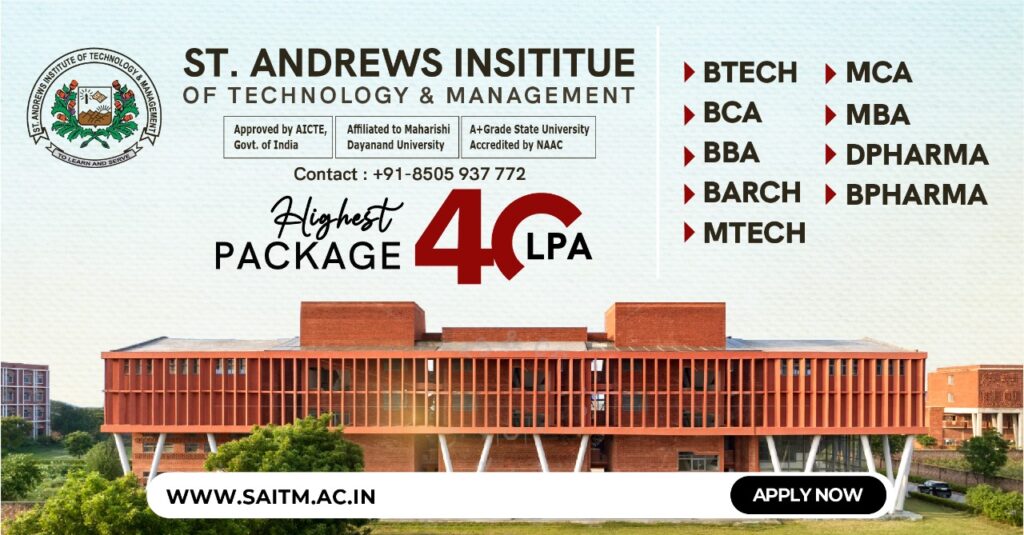
Image – 29 SAITM Courses Overview
Recruiters for online MBA graduates can vary depending on the industry, specialization, and reputation of the program.
Here are some common types of recruiters who actively seek candidates with online MBA qualifications:
Corporations and Multinational Companies
Large corporations and multinational companies often recruit MBA graduates for various roles in management, finance, marketing, operations, human resources, and strategic planning. These companies may have dedicated recruitment teams or participate in career fairs and networking events to identify top talent from online MBA programs.
Consulting Firms
Consulting firms, including management consulting, strategy consulting, and IT consulting firms, actively recruit MBA graduates for positions that require strong analytical, problem-solving, and project management skills. Online MBA graduates with relevant experience and expertise may find opportunities in consulting roles.
Financial Institutions:
Banks, investment firms, asset management companies, and insurance companies frequently hire MBA graduates for roles in finance, investment banking, wealth management, and risk management. Online MBA graduates with a finance specialization or relevant experience may be attractive candidates for these positions.
Technology Companies
Technology companies, including software firms, IT services providers, and tech startups, often seek MBA graduates with a blend of business acumen and technical expertise. Online MBA graduates with a specialization in information technology management or relevant experience in the tech industry may find opportunities in product management, business development, and strategic planning roles.
Healthcare Organizations
Healthcare organizations, including hospitals, pharmaceutical companies, and healthcare consulting firms, value MBA graduates with a strong understanding of healthcare management, finance, and policy. Online MBA graduates with a specialization in healthcare management or relevant experience in the healthcare industry may pursue roles in healthcare administration, operations management, and strategic planning.
Nonprofit and Government Organizations
Nonprofit organizations, government agencies, and international organizations often seek MBA graduates with a passion for social impact, public policy, and organizational leadership. Online MBA graduates with a specialization in nonprofit management, public administration, or social entrepreneurship may find opportunities in these sectors.
Entrepreneurial Ventures
Many online MBA graduates choose to pursue entrepreneurial ventures or startups, leveraging their business education and skills to launch and grow successful businesses. Recruiters for entrepreneurial ventures may include venture capital firms, angel investors, startup accelerators, and incubators seeking talented entrepreneurs and business leaders.
Distance MBA Recruiters
Recruiters for distance MBA graduates can vary depending on factors such as industry, specialization, and the reputation of the institution offering the program. While some recruiters may specifically target graduates from traditional full-time MBA programs, many organizations also recognize the value of distance MBA qualifications and actively seek candidates with relevant skills and expertise.
Here are some common types of recruiters who may consider candidates with distance MBA qualifications:
Corporations and Multinational Companies:
Large corporations and multinational companies often have recruitment processes that are open to candidates with diverse educational backgrounds, including distance MBA graduates. These organizations may offer opportunities in various functional areas such as management, finance, marketing, operations, human resources, and strategic planning.
Consulting Firms:
Consulting firms, including management consulting, strategy consulting, and IT consulting firms, value candidates with strong analytical, problem-solving, and project management skills. Distance MBA graduates who demonstrate these competencies may find opportunities in consulting roles that involve working with clients to solve complex business challenges.
Financial Institutions
Banks, investment firms, asset management companies, and insurance companies frequently hire MBA graduates for roles in finance, investment banking, wealth management, and risk management. Distance MBA graduates with a specialization in finance or relevant experience in the financial services industry may be attractive candidates for these positions.
Technology Companies:
Technology companies, including software firms, IT services providers, and tech startups, often seek candidates with a blend of business acumen and technical expertise. Distance MBA graduates with a specialization in information technology management or relevant experience in the tech industry may find opportunities in product management, business development, and strategic planning roles.
Healthcare Organizations:
Healthcare organizations, including hospitals, pharmaceutical companies, and healthcare consulting firms, value candidates with a strong understanding of healthcare management, finance, and policy. Distance MBA graduates with a specialization in healthcare management or relevant experience in the healthcare industry may pursue roles in healthcare administration, operations management, and strategic planning.
Nonprofit and Government Organizations:
Nonprofit organizations, government agencies, and international organizations often seek candidates with a passion for social impact, public policy, and organizational leadership. Distance MBA graduates with a specialization in nonprofit management, public administration, or social entrepreneurship may find opportunities in these sectors.
Entrepreneurial Ventures:
Many distance MBA graduates choose to pursue entrepreneurial ventures or startups, leveraging their business education and skills to launch and grow successful businesses. Recruiters for entrepreneurial ventures may include venture capital firms, angel investors, startup accelerators, and incubators seeking talented entrepreneurs and business leaders.
FAQs
1. What is the difference between Distance MBA and Online MBA courses?
Distance MBA courses typically involve learning through printed study materials, occasional in-person sessions, and limited online resources. On the other hand, Online MBA courses are delivered entirely through digital platforms, including online lectures, discussion forums, and virtual classrooms. While both offer flexibility for remote learning, online MBA courses may provide more interactive and real-time engagement opportunities.
2. Are Distance MBA courses recognized by employers?
Distance MBA courses offered by accredited institutions are generally recognized by employers, especially if the institution has a reputable brand and accreditation from recognized bodies. However, it’s essential for students to verify the accreditation status of the institution and program before enrolling to ensure recognition and credibility.
3. Can I pursue a Distance MBA course while working full-time?
Yes, one of the primary benefits of Distance MBA courses is their flexibility, allowing students to balance their studies with full-time employment. Students can study at their own pace and schedule, making it feasible to continue working while pursuing an MBA.
4. Are Online MBA (Master of Business Administration) courses as rigorous as traditional on-campus MBA (Master of Business Administration) programs?
The rigor of Online MBA courses can vary depending on the institution and program. However, many reputable online MBA programs maintain the same academic standards and curriculum as their on-campus counterparts. Online MBA courses often require a similar level of commitment, academic rigor, and participation in coursework, assignments, and examinations.
5. How long does it take to complete a Distance MBA or Online MBA course?
The duration of Distance MBA and Online MBA courses varies depending on factors such as the program structure, credit requirements, and student’s pace of study. Typically, these programs can be completed within two to three years, although some accelerated options may allow completion in a shorter timeframe.
6. Can I specialize in a specific area during a Distance MBA or Online MBA course?
Yes, many Distance MBA and Online MBA programs offer specializations or concentrations in various areas such as Marketing, Finance, Human Resource Management, Information Technology, Operations Management, and Entrepreneurship. Specializations allow students to tailor their MBA education to align with their career goals and interests.
7. Will I have access to networking opportunities and alumni connections during a Distance MBA or Online MBA course?
While networking opportunities and alumni connections may differ from traditional on-campus MBA programs, many Distance MBA and Online MBA programs offer virtual networking events, alumni databases, and online communities to facilitate connections with peers, faculty, industry professionals, and alumni. These networking opportunities can be valuable for building relationships, exploring career opportunities, and accessing industry insights.





